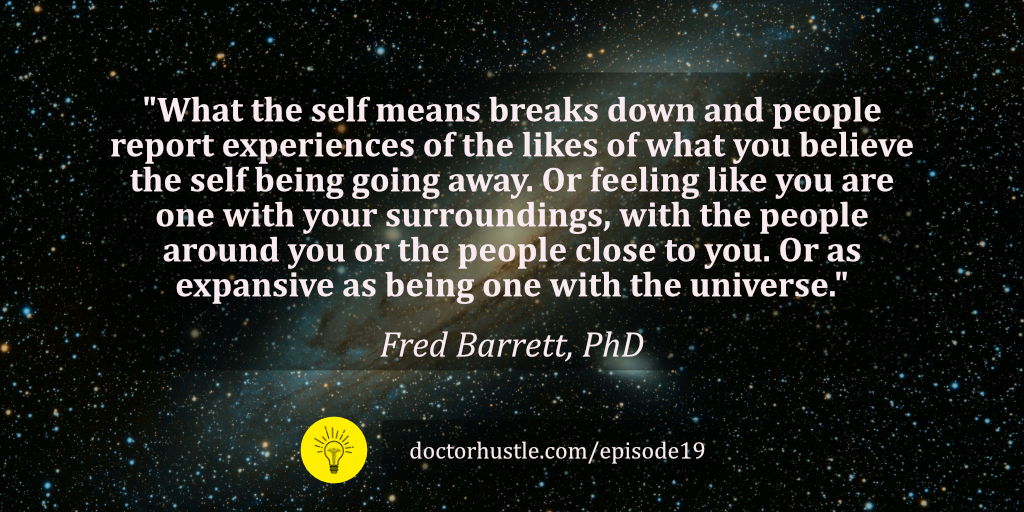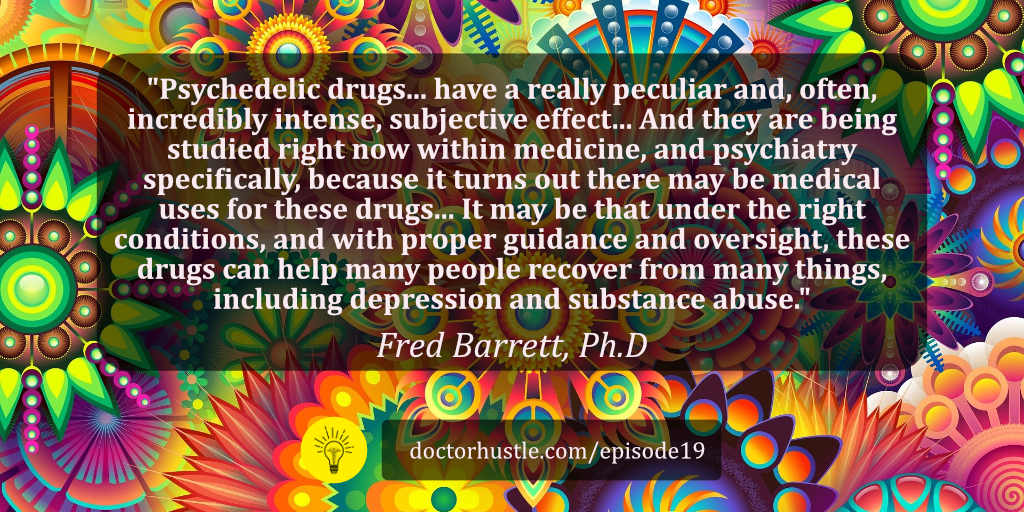The subject of today’s episode is psychedelics. We’re talking magic mushrooms, LSD, and other drugs that are currently being studied to explore their efficacy on a variety of substance and mood disorders. Medicine is often considered a rigid, hierarchical system with its regulations, protocols, and taboos. So I am excited to bring on a scientist who works at the Johns Hopkins Center for Psychedelic and Consciousness Research, who is working on the literal frontiers of the science of the brain and mind.
Dr. Frederick Barrett is a cognitive neuroscientist with training in behavioral pharmacology. He has been conducting psychedelic research at Johns Hopkins University since 2013. He has explored the effects of psilocybin on the brain, the effects of LSD on the brain’s response to music, and is currently leading a number of ongoing studies aimed at better understanding the psychological, biological, and neural mechanisms underlying the therapeutic efficacy of psychedelic drugs.
There’s a lot to unpack here and I am excited to share our conversation to show you where the field is headed. So without further ado, here’s Dr. Fred Barrett.
Show Notes
- (00:02:09): When someone asks you what you do for a living, how do you respond?
- (00:02:39): What kinds of reactions do you get when people find out you study psychedelics?
- (00:04:17): How did you decide that you wanted to do neuroscience research?
- (00:08:30): What was it that drew you towards psychology?
- (00:12:19): What were insights you gained when studying the intersection of music and psychology?
- (00:21:17): Discussing nostalgia, which is likely to invoke a stronger response: age or a strong experience?
- (00:23:08): What are psychedelics and why are they important?
- (00:24:31): Were psychedelics used for millennia by indigenous people?
- (00:27:12): In the mid-20th century, when synthetic psychedelics were created, how were they studied?
- (00:33:30): What might someone experience on a psychedelic drug?
- (00:38:27): What happens in the brain when someone is taking a psychedelic drug?
- (00:53:21): What are some of the projects that you and your team are working on at the Johns Hopkins Center for Psychedelics and Consciousness Research?
- (00:55:15): When doing this research, how do you decide what is an appropriate dose or how do we prepare patients for this experience so that the protocols are standardized?
- (00:59:45): How would you describe the controlled settings of the room to ensure the subjects feels safe and that they are getting therapy?
- (01:02:42): Guiding the subjects must also be a very intense and meaningful experience for the therapists as well.
- (01:04:49): Other than depression, what other conditions are psychedelics being investigated for potential efficacy?
- (01:07:48): Is it still too early to tell if society will accept psychedelics?
- (01:12:28): Are there any resources you can recommend in case people want to learn more about psychedelics?
- (01:14:49): What kind of music is usually played in these therapy sessions?
- (01:17:36): If there was any kind of message you wanted to share with the public about these drugs, what would it be?
- (01:18:41): Where can people find you?

Links for Dr. Barrett
- Fred Barrett Twitter
- Fred Barrett Academic Profile at John Hopkins Medicine
- Center for Psychedelic and Consciousness Research Profile
- Fred Barrett PubMed Profile
Psychedelics Mentioned
- Lysergic acid diethylamide (LSD)
- Ayahuasca
- 3,4-Methyl
enedioxy methamphetamine (MDMA) - N,N-Dimethyltryptamine (DMT or N,N-DMT)
- Psilocybin
Institutions Mentioned
- John Hopkins Center for Psychedelic and Consciousness Research
- Multidisciplinary Association for Psychedelic Studies
People Mentioned
Further Reading
- Doors of Perception by Aldous Huxley
- “Seeking the Magic Mushroom” – R. Gordon Wasson – Life Magazine
- How to Change Your Mind by Michael Pollan
- Altered States – Oliver Sacks – The New Yorker
Further Listening
- Wavepaths
- Psychedelic Research Spotify Playlist
- Inside the Johns Hopkins Psilocybin Playlist
- Five Scientifically Approved Playlists for Psychedelics Therapy

Music
Music by Lee Rosevere – Sad Marimba Planet from freemusicarchive.org
“In man’s evolutionary past, as he groped his way out from his lowly past, there must have come a moment in time when he discovered the secret of the hallucinatory mushrooms. Their effect on him, as I see it, could only have been profound, a detonator to new ideas. For the mushrooms revealed to him worlds beyond the horizons known to him, in space and time, even worlds on a different plane of being, a heaven and perhaps a hell. For the credulous primitive mind, the mushrooms must have reinforced mightily the idea of the miraculous.”
– R. Gordon Wasson, “Seeking the Magic Mushroom”, Life Magazine
